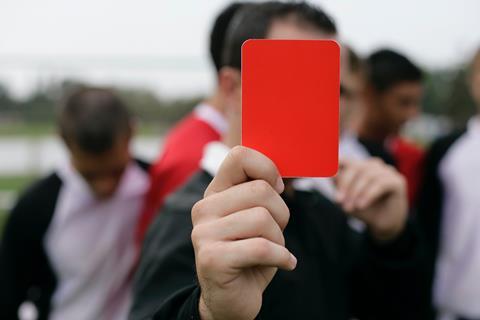Football is following in Rugby’s footsteps and introducing sin bins in an attempt to deal with bad behaviour on the pitch. It got Tim Bechervaise thinking: what else in society could do with a time out?

If someone were to ask you for words that could be considered Christian jargon, what would you say?
High on your list might be “sin”.
To Christians, it’s a serious thing (and rightly so) but explaining it to someone with little or no church background is enough to make many of us break out into a nervous sweat. Or is that just me?
The word doesn’t (usually) land easily in society but, in recent days, it has re-emerged into the cultural conversation. Well, kind of. In the ever complicated and controversial world of football, sin bins are to be trialled in the professional game after successful tests at grassroots level.
Rugby and Ice Hockey fans will already be familiar with the term. A sin bin is a box or bench where offending players can be sent for a period as a penalty for wrong behaviour. Think of it as a naughty step.
The International Football Association Board (who are responsible for making the rules) announced the move to clamp down on player behaviour. But it’s got me thinking: what and who else but naughty footballers could do with spending some time in the sin bin?
1. Twitter, X or whatever it’s called
The platform is just not that fun or healthy anymore – although many might argue it never has been. Chaotically led by Elon Musk, it’s an echo chamber that plays into the hands of keyboard warriors; it makes you follow accounts you didn’t ask to follow and gives you an endless stream of irritating ads (yes X, I like football, but it doesn’t mean I want to bet on games). Arguably, it could do with being given the red card.
2. Christmas cards
How many times, on average, do you look at the Christmas cards you’ve been given? Probably once before they go out for recycling in the first week of January. I’m not against cards per se, but when it’s nothing more than your name and mine, sandwiched between a glib pleasantry, is there much point? It can be done well – be selective in who you send to and include a personalised message – but too often it feels like little more than a tick-box tradition. Perhaps we should take a leaf out of M&S’s book and do away with it for a while?
3. Small talk
Brits don’t do small talk well. Whether in the office, on the streets or even in church, our conversations tend to be predictable and safe, too often going no deeper than surface level. How many times this week have you discussed the weather? “Oh, isn’t it cold out there?” (For me, at least five times.) But it’s amazing what can emerge when we’re a little more creative and bolder with our questions for people, doing wonders for relationships. Challenge yourself and give it a go.
4. Smart phones
Speaking of predictable, of course smart phones need some time on the naughty step. They’re wonderful for staying in touch with people, getting us around, keeping us entertained, waking us up… but we’re too attached to them, and prising ourselves away a tad more could free us for something more productive – like reading, chatting (in person!) and even praying. In true sin bin fashion, how about trying ten minutes away from it each day for a week?
5. The government
Where do I even start? Whether it’s hypocrisy over lockdown rules, misjudged remarks, needless bickering, broken promises or [insert your own gripe here], it’s fair to say the leaders of our country have often got it wrong. Now, that’s not to say they can’t make errors, but it’s perhaps fair to conclude the government have often fallen short of our minimal expectations. At least those on the naughty step at Downing Street will have Larry the cat for company.
6. Artificial Intelligence (AI)
A big development this year is Chat GPT, prompting conversations about its use in our lives (including writing sermons) and what the future of AI looks like. Whatever our views and use of it, it’s motoring forward at a frightening pace, leaving various practical and ethical considerations in its wake. It surely needs a time out, if only to give us all space to breathe and perhaps ask whether the future it may give us is one we actually want.
7. And finally… streaming platforms
Subscription-based streaming platforms, like Netflix and Disney+, dominate the market, bringing huge shifts in our viewing habits. It provides much enjoyment, but there are drawbacks: there is way too much to choose from (last weekend I spent 30 minutes browsing through Netflix and Amazon Prime, and still couldn’t decide what to watch); a fair bit of content is not good (see the plethora of Christmas films available); and the services are designed to have us keep coming back for more. Some time on the naughty step would perhaps benefit us all this Christmas.






































No comments yet